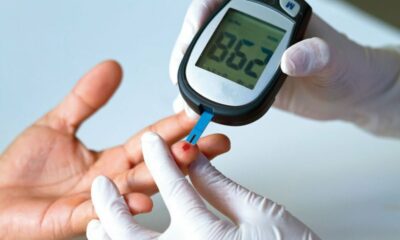Diabetes is a chronic health condition that affects how your body turns food into energy. It occurs when your blood glucose, or blood sugar, is too high. Over time, having too much glucose in your blood can cause serious health problems, such as heart disease, nerve damage, eye problems, and kidney disease. By identifying the early symptoms of diabetes, you can take proactive steps to manage your health and prevent complications. This comprehensive guide delves into the early symptoms of diabetes, their implications, and strategies for maintaining better health through early detection and management.
Understanding Diabetes
Types of Diabetes
- Type 1 Diabetes: An autoimmune condition where the body attacks insulin-producing cells in the pancreas. It usually appears in childhood or adolescence but can develop in adults.
- Type 2 Diabetes: The most common form of diabetes, where the body becomes resistant to insulin or doesn’t produce enough insulin. It often develops in adults but can also occur in children.
- Gestational Diabetes: Occurs during pregnancy and usually disappears after giving birth. However, it increases the risk of developing type 2 diabetes later in life.
- Prediabetes: A condition where blood sugar levels are higher than normal but not yet high enough to be classified as type 2 diabetes. It increases the risk of developing type 2 diabetes.
The Importance of Early Detection
Early detection of diabetes is crucial for managing the condition effectively and preventing complications. By recognizing the early symptoms, individuals can seek medical advice, undergo testing, and start appropriate treatment. Early intervention can significantly improve quality of life and reduce the risk of severe health issues.
Early Symptoms of Diabetes
Common Early Symptoms
- Frequent Urination (Polyuria)
One of the earliest and most common symptoms of diabetes is frequent urination. High blood sugar levels cause the kidneys to filter out excess glucose, leading to increased urine production.
- Excessive Thirst (Polydipsia)
As a result of frequent urination, the body loses more water, leading to dehydration. This triggers excessive thirst, a condition known as polydipsia.
- Extreme Hunger (Polyphagia)
Despite eating regularly, individuals with diabetes often experience extreme hunger. This is because the body’s cells are not getting enough glucose, prompting the body to crave more food.
- Unexplained Weight Loss
Even though diabetes can cause increased hunger and food intake, many people with undiagnosed diabetes lose weight. This happens because the body starts breaking down fat and muscle for energy when it can’t use glucose effectively.
- Fatigue and Weakness
High blood sugar levels can impair the body’s ability to use glucose for energy, leading to persistent fatigue and weakness. This is a common early symptom of diabetes.
- Blurred Vision
Elevated blood sugar levels can cause the lens of the eye to swell, leading to blurred vision. If left untreated, this can progress to more serious eye problems.
- Slow-Healing Sores or Cuts
Diabetes affects blood circulation and can impair the immune system, causing wounds to heal slowly. This is particularly common in the extremities, such as the feet.
- Frequent Infections
High blood sugar levels can weaken the immune system, making individuals more susceptible to infections. Common infections include skin infections, urinary tract infections, and yeast infections.
- Tingling or Numbness in Hands or Feet (Neuropathy)
Diabetes can damage the nerves, leading to tingling, numbness, or pain in the hands and feet. This condition is known as diabetic neuropathy and is often one of the earliest signs of nerve damage.
- Dry Mouth and Itchy Skin
Dehydration caused by frequent urination can lead to dry mouth and itchy skin. High blood sugar levels can also affect skin health, causing it to become dry and irritated.
Less Common Early Symptoms
- Dark Patches of Skin (Acanthosis Nigricans)
Acanthosis nigricans is a condition characterized by dark, velvety patches of skin, usually in the folds of the neck, armpits, or groin. It is often a sign of insulin resistance and can be an early indicator of diabetes.
- Sudden Vision Changes
In addition to blurred vision, diabetes can cause sudden changes in vision, such as fluctuating clarity and temporary blindness. This occurs due to changes in blood sugar levels affecting the eye’s fluid balance.
- Irritability and Mood Swings
High or fluctuating blood sugar levels can affect mood and lead to irritability, mood swings, and even symptoms of depression and anxiety.
- Persistent Itching or Yeast Infections
High blood sugar levels can create an environment conducive to yeast growth, leading to persistent itching and recurrent yeast infections, particularly in the genital area.
- Fruity-Smelling Breath
When the body starts breaking down fat for energy, it produces ketones, which can cause a fruity-smelling breath. This is more common in type 1 diabetes and can be a sign of diabetic ketoacidosis, a serious condition requiring immediate medical attention.
Implications of Early Symptoms
Health Risks of Undiagnosed Diabetes
- Cardiovascular Disease
Undiagnosed diabetes significantly increases the risk of cardiovascular diseases, including heart attacks, strokes, and high blood pressure. High blood sugar levels can damage blood vessels and the heart over time.
- Nerve Damage (Neuropathy)
Persistently high blood sugar levels can cause nerve damage, leading to pain, tingling, and loss of sensation, particularly in the extremities. This can result in serious complications, including infections and amputations.
- Kidney Damage (Nephropathy)
Diabetes is a leading cause of kidney damage and kidney failure. High blood sugar levels can damage the blood vessels in the kidneys, impairing their ability to filter waste from the blood.
- Eye Damage (Retinopathy)
Diabetes can cause damage to the blood vessels in the retina, leading to diabetic retinopathy. This condition can result in vision loss and blindness if left untreated.
- Skin Conditions
Diabetes can affect the skin, causing a range of issues, including bacterial and fungal infections, itching, and poor wound healing. Early detection and management can help prevent these complications.
- Mental Health Issues
The stress of managing a chronic condition like diabetes can lead to mental health issues, including depression, anxiety, and diabetes distress. Early diagnosis and proper management can help mitigate these effects.
Importance of Medical Consultation
Recognizing the early symptoms of diabetes and seeking medical consultation is crucial. Healthcare providers can conduct tests to diagnose diabetes, including:
- Fasting Blood Glucose Test: Measures blood sugar levels after an overnight fast.
- A1C Test: Provides an average blood sugar level over the past 2-3 months.
- Oral Glucose Tolerance Test: Measures blood sugar levels before and after consuming a sugary drink.
- Random Blood Glucose Test: Measures blood sugar levels at any time, regardless of when you last ate.
Early diagnosis allows for timely intervention, which can significantly improve outcomes and prevent complications.
Strategies for Maintaining Better Health
Lifestyle Modifications
- Healthy Diet
A balanced diet is crucial for managing blood sugar levels. Focus on:
- Whole Grains: Choose whole grains over refined grains to maintain steady blood sugar levels.
- Fruits and Vegetables: Aim for a variety of colors and types to get a range of nutrients.
- Lean Proteins: Include sources such as fish, poultry, beans, and nuts.
- Healthy Fats: Opt for unsaturated fats from sources like olive oil, avocados, and nuts.
- Fiber: Increase fiber intake to help control blood sugar levels.
- Regular Physical Activity
Exercise helps regulate blood sugar levels and improve insulin sensitivity. Aim for at least 150 minutes of moderate-intensity aerobic activity, such as brisk walking, each week, along with strength training exercises twice a week.
- Weight Management
Maintaining a healthy weight is crucial for managing diabetes. Losing even a small amount of weight can improve blood sugar control and reduce the risk of complications.
- Hydration
Staying hydrated helps regulate blood sugar levels. Drink plenty of water throughout the day and limit sugary drinks.
- Stress Management
Chronic stress can affect blood sugar levels. Practice stress-reducing techniques such as deep breathing, meditation, yoga, and mindfulness.
Medical Management
- Medications
For those diagnosed with diabetes, medications may be necessary to manage blood sugar levels. These can include:
- Insulin: Required for type 1 diabetes and sometimes for type 2 diabetes.
- Oral Medications: Help lower blood sugar levels and improve insulin sensitivity.
- Injectable Medications: Other than insulin, such as GLP-1 receptor agonists, which help regulate blood sugar levels.
- Regular Monitoring
Regular monitoring of blood sugar levels is essential for managing diabetes effectively. This can involve:
- Self-Monitoring: Using a blood glucose meter to check blood sugar levels at home.
- Continuous Glucose Monitoring (CGM): A device that tracks blood sugar levels throughout the day and night.
- Routine Check-Ups
Regular check-ups with healthcare providers are crucial for monitoring the condition and preventing complications. These appointments may include:
- Eye Exams: To check for signs of diabetic retinopathy.
- Foot Exams: To check for nerve damage and prevent infections.
- Kidney Function Tests: To monitor kidney health.
- A1C Tests: To track long-term blood sugar control.
Educational Resources and Support
- Diabetes Education Programs
Participating in diabetes education programs can provide valuable information and support for managing the condition. These programs cover topics such as nutrition, exercise, medication management, and coping strategies.
- Support Groups
Joining a diabetes support group can provide emotional support, practical tips, and a sense of community. Sharing experiences with others facing similar challenges can be beneficial.
- Online Resources
Many reputable organizations offer online resources for diabetes management, including the American Diabetes Association (ADA), the Centers for Disease Control and Prevention (CDC), and the World Health Organization (WHO).
Conclusion
Recognizing the early symptoms of diabetes is vital for maintaining better health and preventing complications. By understanding the common and less common symptoms, individuals can seek medical advice, undergo appropriate testing, and start necessary treatments early. Lifestyle modifications, regular monitoring, and medical management play crucial roles in managing diabetes effectively. Educational resources and support systems can also provide valuable assistance. By taking proactive steps and staying informed, individuals can achieve better health outcomes and improve their quality of life despite the challenges of diabetes.

 Diabetology2 weeks ago
Diabetology2 weeks ago
 Diabetology2 weeks ago
Diabetology2 weeks ago
 Diabetology2 weeks ago
Diabetology2 weeks ago
 Diabetology1 week ago
Diabetology1 week ago
 Diabetology2 days ago
Diabetology2 days ago
 Diabetology1 day ago
Diabetology1 day ago
 Diabetology1 day ago
Diabetology1 day ago
 Diabetology39 minutes ago
Diabetology39 minutes ago











